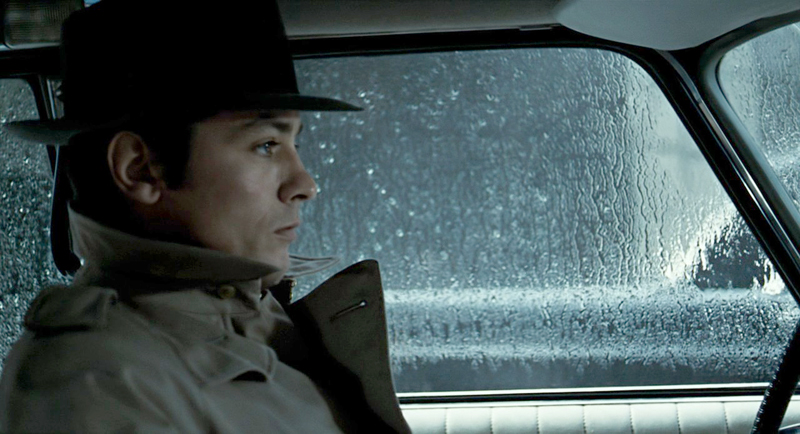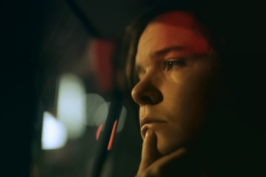From the first few minutes of Le Samouraï, Melville places us in an austere, dark, shadowy world filled with foreboding, suspense, and drama.
This crime film classic introduces us to killer-for-hire Jef Costello, played by Alain Delon, in a quiet yet evocative manner. Costello has been hired to kill a Paris club owner. He executes this methodically starting with his setting up two solid alibis, to his cold and detached manner in telling the man he’s there to kill him. What Costello did not expect, however, was the club’s Piano player, a very attractive Caty Rosier, to catch him minutes after the act.
And thus, Costello finds himself in a perilous situation. The police begin hunting down a killer wearing a fedora in a trench coat; a description matched by hundreds of men in Paris the night of the crime. Police superintendant, played slyly by François Périer, has a hunch that Costello is hiding something and questions the perfect alibis he presents. Here is where the cat-and-mouse chase begins.
The mood in the film is cool and composed, just like Delon’s portrayal of Costello. Melville chooses grey and blue hues throughout the film to emphasize Costello’s existence as a loner. One of my favourite scenes comes in the first 2-8 minutes of the film, in which we are placed in Costello’s apartment, where he lays on his bed smoking a cigarette.

There are are no big action sequences, nor major chases, and there is little dialogue in Le Samouraï. Costello navigates through Paris by car and by Métro. One of the best sequences in the film comes when the police chase Costello through Paris’ Métro only to have him outsmart them yet again. Even here, I am sympathetic towards Costello and even root for him to get away. Costello is like a samurai in that he honours his work, and simple existence until the very end. Delon’s performance is one of his best and has been influential to other actors since. He says more with his eyes and the way he handles a gun than any words could convey. In a recent interview I watched, Delon mentioned that Melville created Costello to be this quiet, perfectionistic, loner of a man. Delon simply portrayed him the way Melville had suggested. Nonetheless, credit to Delon for an outstanding performance that stays with you well after the film has ended.
The rest of the cast fits perfectly within the film, from Périer’s superintendent to Delon’s real-life wife and love interest in the film, Nathalie Delon. Other aspects of the film worth noting are its cinematography, which in repeated viewings, I’ve come to appreciate even more. And lastly, the score, which from the very first seconds of the film draws you into a world in which you are unsure who will survive at the end.
Le Samouraï is a film that stands the test of time in its genre. An excellent film noir, and certainly one of Jean-Pierre Melville’s best. If you have patience for quiet yet strong performances, and are looking for something ‘different,’ or simply have to revisit this classic, I highly recommend it.







great post! a truly beautiful film that influenced many to come. It’s so good it rises above any sense of genre.
Thank you so much for your comment Brent. It certainly is a wonderful film for so many reasons. Always good to revisit it.
It is as you say. Nothing more to add.
I appreciate your in-depth analysis of the movie. Thank you.
Thank you for reading, George. Glad you enjoyed this piece on one of my favourite films.